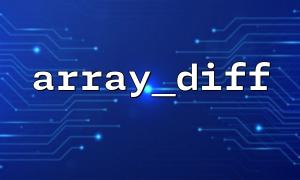In PHP, array_diff() is a very practical function to compare two or more arrays and return values that exist in the first array but not in other arrays. When we process string arrays containing special characters (such as @ , # , % , &, etc.), we can also use this function to easily implement differential set comparison.
This article will introduce the basic usage of array_diff() and use examples to show how to deal with string arrays containing special characters.
array_diff(array $array1, array ...$arrays): array
This function compares $array1 with one or more arrays followed and returns a value that only exists in $array1 and does not appear in other arrays.
Note: Comparison is based on values and uses loose comparisons (==) and does not compare key names.
Suppose you have two arrays with the following content:
$array1 = ['apple', 'banana', 'cherry@', 'date#', 'egg&'];
$array2 = ['banana', 'date#', 'fig$', 'grape'];
You want to find out the elements that exist in $array1 but do not exist in $array2 , even if they contain special characters.
You can use array_diff() directly, because PHP does not do special processing for special characters when comparing strings, and can still compare them normally.
<?php
$array1 = ['apple', 'banana', 'cherry@', 'date#', 'egg&'];
$array2 = ['banana', 'date#', 'fig$', 'grape'];
$result = array_diff($array1, $array2);
echo "Differential results:\n";
print_r($result);
// If you want to generate one of these difference elements URL Query parameter form:
$queryString = http_build_query(['items' => array_values($result)]);
echo "\nYou can use the following link to access the query result page:\n";
echo "https://m66.net/show_diff.php?$queryString";
?>
The output result is:
Differential results:
Array
(
[0] => apple
[2] => cherry@
[4] => egg&
)
You can use the following link to access the query result page:
https://m66.net/show_diff.php?items%5B0%5D=apple&items%5B1%5D=cherry%40&items%5B2%5D=egg%26
Special characters do not affect how array_diff() works.
If you need to deal with comparisons with case differences, you can first uniformly process the elements in the array (such as using strtolower() ).
If you get a string array from user input, remember to do basic filtering and escape to prevent injection attacks and other problems.
Compare two data sets from different sources (such as database and user uploaded data).
Identify unsynced data records.
Implement keyword filtering function, find input content that has not been covered by the filtered vocabulary library, etc.














